- Home
- Lloyd Alexander
The Castle of Llyr (The Chronicles of Prydain)
The Castle of Llyr (The Chronicles of Prydain) Read online
For the Friends of the Companions, fondly
Table of Contents
Title Page
CHAPTER ONE - Prince Rhun
CHAPTER TWO - Dinas Rhydnant
CHAPTER THREE - The Shoemaker
CHAPTER FOUR - Shadows
CHAPTER FIVE - The Oath
CHAPTER SIX - The Potions of Glew
CHAPTER SEVEN - The Lair of Llyan
CHAPTER EIGHT - The Harp of Fflewddur
CHAPTER NINE - The Luck of Rhun
CHAPTER TEN - The Cavern
CHAPTER ELEVEN - King of the Stones
CHAPTER TWELVE - The Tomb
CHAPTER THIRTEEN - The Ladder
CHAPTER FOURTEEN - The Empty Book
CHAPTER FIFTEEN - The Island
CHAPTER SIXTEEN - A Meeting of Strangers
CHAPTER SEVENTEEN - The Spells of Caer Colur
CHAPTER EIGHTEEN - The Golden Pelydryn
CHAPTER NINETEEN - The Flood
CHAPTER TWENTY - The Pledge
Author’s Note
The Chronicles of Prydain by Lloyd Alexander:
Prydain Pronunciation Guide
About the Author
Copyright Page
CHAPTER ONE
Prince Rhun
Eilonwy of the red-gold hair, the Princess Eilonwy Daughter of Angharad Daughter of Regat of the Royal House of Llyr, was leaving Caer Dallben. Dallben himself had so ordered it; and though Taran’s heart was suddenly and strangely heavy, he knew there was no gainsaying the old enchanter’s words.
On the spring morning set for Eilonwy’s departure, Taran saddled the horses and led them from the stable. The Princess, looking desperately cheerful, had wrapped her few belongings in a small bundle slung from her shoulder. At her neck hung a fine chain and crescent moon of silver; on her finger she wore a ring of ancient craftsmanship; and in the fold of her cloak she carried another of her most prized possessions: the golden sphere that shone at her command with a light brighter than a flaming torch.
Dallben, whose face was more careworn than usual and whose back was bowed as though under a heavy burden, embraced the girl at the cottage door. “You shall always have a place in Caer Dallben,” he said, “and a larger one in my heart. But, alas, raising a young lady is a mystery beyond even an enchanter’s skill. I have had,” he added with a quick smile, “difficulties enough raising an Assistant Pig-Keeper.
“I wish you a fair voyage to the Isle of Mona,” Dallben went on. “King Rhuddlum and Queen Teleria are kindly and gracious. They are eager to stand in your family’s stead and serve as your protectors, and from Queen Teleria you shall learn how a princess should behave.”
“What!” cried Eilonwy. “I don’t care about being a princess! And since I’m already a young lady, how else could I behave? That’s like asking a fish to learn how to swim!”
“Hem!” Dallben said wryly. “I have never seen a fish with skinned knees, torn robe, and unshod feet. They would ill become him, as they ill become you.” He set a gnarled hand gently on Eilonwy’s shoulder. “Child, child, do you not see? For each of us comes a time when we must be more than what we are.” He turned now to Taran. “Watch over her carefully,” he said. “I have certain misgivings about letting you and Gurgi go with her, but if it will ease your parting, so be it.”
“The Princess Eilonwy shall go safely to Mona,” Taran answered.
“And you,” said Dallben, “return safely. My heart will not be at ease until you do.” He embraced the girl again and went quickly into the cottage.
It had been decided that Coll would accompany them to Great Avren harbor and lead back the horses. The stout old warrior, already mounted, waited patiently. Shaggy-haired Gurgi, astride his pony, looked as mournful as an owl with a stomachache. Kaw, the tame crow, perched in unwonted silence on Taran’s saddle. Taran helped Eilonwy mount Lluagor, her favorite steed, then swung to the back of Melynlas, his silver-maned stallion.
Leaving Caer Dallben behind, the little band set out across the soft hills toward Avren. Side by side Taran and Coll rode ahead of the others to lead the way, Kaw meanwhile having made himself comfortable on Taran’s shoulder.
“She never stopped talking for a moment,” Taran said gloomily. “Now, at least, it will be quieter in Caer Dallben.”
“That it will,” said Coll.
“And less to worry about. She was always getting into one scrape or another.”
“That, too,” said Coll.
“It’s for the best,” Taran said. “Eilonwy is, after all, a Princess of Llyr. It’s not as if she were only an Assistant Pig-Keeper.”
“Very true,” said Coll, looking off toward the pale hills.
They jogged along silently for a while.
“I shall miss her,” Taran burst out at last, half angrily.
The old warrior grinned and rubbed his shining bald head. “Did you tell her that?”
“Not—not exactly,” faltered Taran. “I suppose I should have. But every time I began talking about it I—I felt very odd. Besides, you never know what silly remark she’ll come out with when you’re trying to be serious.”
“It may be,” replied Coll, smiling, “we know least what we treasure most. But we will have more than enough to keep us busy when you come back, and you will learn, my boy, there is nothing like work to put the heart at rest.”
Taran nodded sadly. “I suppose so,” he said.
Past midday they turned their horses to the west, where the hills began a long slope downward into the Avren valley. At the last ridge Kaw hopped from Taran’s shoulder and flapped aloft, croaking with excitement. Taran urged Melynlas over the rise. Below, the great river swung into view, wider here than he had ever seen it. Sunlight flecked the water in the sheltered curve of the harbor. A long, slender craft bobbed at the shore. Taran could make out figures aboard, hauling on ropes to raise a square, white sail.
Eilonwy and Gurgi had also ridden forward. Taran’s heart leaped; and to all the companions the sight of the harbor and the waiting vessel was like a sea wind driving sorrow before it. Eilonwy began chattering gaily, and Gurgi waved his arms so wildly he nearly tumbled from the saddle.
“Yes, oh yes!” he cried. “Bold, valiant Gurgi is glad to follow kindly master and noble Princess with boatings and floatings!”
They cantered down the slope and dismounted at the water’s edge. Seeing them, the sailors ran a plank out from the vessel to the shore. No sooner had they done so than a young man clambered onto the plank and hastened with eager strides toward the companions. But he had taken only a few paces along the swaying board when he lost his footing, stumbled, and with a loud splash pitched headlong into the shallows.
Taran and Coll ran to help him, but the young man had already picked himself up and was awkwardly sloshing his way ashore. He was of Taran’s age, with a moon-round face, pale blue eyes, and straw-colored hair. He wore a sword and a small, richly ornamented dagger in a belt of silver links. His cloak and jacket, worked with threads of gold and silver, were now sopping wet; the stranger, however, appeared not the least dismayed either by his ducking or the sodden state of his garments. Instead, he grinned as cheerfully as if nothing whatever had befallen him.
“Hullo, hullo!” he called, waving a dripping hand. “Is that Princess Eilonwy I see? Of course! It must be!”
Without further ado, and without stopping even to wring out his cloak, he bowed so low that Taran feared the young man would lose his balance; then he straightened up and in a solemn voice declared: “On behalf of Rhuddlum Son of Rhudd and Teleria Daughter of Tannwen, King and Queen of the Isle of Mona, greetings to the Princess Eilonwy
of the Royal House of Llyr, and to—well—to all the rest of you,” he added, blinking rapidly as a thought suddenly occurred to him. “I should have asked your names before I started.”
Taran, taken aback and not a little vexed by this scatterbrained behavior, stepped forward and presented the companions. Before he could ask the stranger’s name, the young man interrupted.
“Splendid! You must all introduce yourselves again later, one at a time. Otherwise, I might forget—oh, I see the shipmaster’s waving at us. Something to do with tides, no doubt. He’s always very concerned with them. This is the first time I’ve commanded a voyage,” he went on proudly. “Amazing how easy it is. All you need to do is tell the sailors …”
“But who are you?” Taran asked, puzzled.
The young man blinked at him. “Did I forget to mention that? I’m Prince Rhun.”
“Prince Rhun?” Taran repeated in a tone of disbelief.
“Quite so,” answered Rhun, smiling pleasantly. “King Rhuddlum’s my father; and, of course, Queen Teleria’s my mother. Shall we go aboard? I should hate to upset the shipmaster, for he does worry about those tides.”
Coll embraced Eilonwy. “When we see you again,” he told her, “I doubt we shall recognize you. You shall be a fine Princess.”
“I want to be recognized!” Eilonwy cried. “I want to be me!”
“Never fear,” said Coll, winking. He turned to Taran. “And you, my boy, farewell. When you return, send Kaw ahead to tell me and I shall meet you at Avren harbor.”
Prince Rhun, offering his arm to Eilonwy, led her across the plank. Gurgi and Taran followed them. Having formed his own opinion of Rhun’s agility, Taran kept a wary eye on the Prince until Eilonwy was safe aboard.
The ship was surprisingly roomy and well-fitted. The deck was long, with benches for oarsmen on either side. At the stern rose a high, square shed topped by a platform.
The sailors dipped their oars and worked the vessel to the middle of the river. Coll trotted along the bank and waved with all his might. The old warrior dropped from sight as the ship swung around a bend in the ever-widening river. Kaw had flapped to the masthead and, as the breeze whistled through his feathers, he beat his wings so pridefully that he looked more like a black rooster than a crow. The shore turned gray in the distance and the craft sped seaward.
If Rhun had perplexed and vaguely irritated him at their first meeting, Taran now began to wish he had never laid eyes on the Prince. Taran had meant to speak with Eilonwy apart, for there was much in his heart he longed to tell her. Yet each time he ventured to do so, Prince Rhun would pop up as if from nowhere, his round face beaming happily, calling out, “Hullo, hullo!”—a greeting Taran found more infuriating each time he heard it.
Once, the Prince of Mona eagerly dashed up to show the companions a large fish he had caught—to the delight of Eilonwy and Gurgi, but not Taran; for a moment later, Rhun’s attention turned elsewhere and he hurried off, leaving Taran holding the wet, slippery fish in his arms. Another time, while leaning over the side to point out a school of dolphins, the Prince nearly dropped his sword into the sea. Luckily Taran caught it before the blade was lost forever.
After the ship reached open water Prince Rhun decided to take a hand at steering. But he no sooner grasped the tiller than it flew out of his fingers. While Rhun clutched at the wooden handle, the vessel lurched and slewed about so violently that Taran was flung against the bulwark. A water cask broke loose and went rolling down the deck, the sail flapped madly at the sudden change of course, and one bank of oars nearly snapped before the steersman regained the tiller from the undismayed Prince. The painful bump on Taran’s head did nothing to raise his esteem of Prince Rhun’s seamanship.
Although the Prince made no further attempt to steer the vessel, he climbed atop the platform where he called out orders to the crew.
“Lash up the sail!” Rhun shouted happily. “Steady the helm!”
No seaman himself, Taran nevertheless realized the sail was already tightly lashed and the craft was moving unwaveringly through the water; and he very shortly became aware that the sailors were quietly going about their task of keeping the ship on course without paying any heed whatever to the Prince.
Taran’s head ached from the bump, his jacket was still unpleasantly damp and fishy, and when at last his chance came to speak with Eilonwy he was altogether out of sorts.
“Prince of Mona indeed!” he muttered. “He’s no more than a—a princeling, a clumsy, muddle-headed baby. Commanding the voyage? If the sailors listened to him, we’d be aground in no time. I’ve never sailed a ship, but I’ve no doubt I could do it better than he. I’ve never seen anyone so feckless.”
“Feckless?” answered Eilonwy. “He does often seem a little dense. But I’m sure he means well, and I’ve a feeling he has a good heart. In fact, I think he’s rather nice.”
“I suppose you do,” Taran replied, all the more nettled by Eilonwy’s words. “Because he gave you his arm to lean on? A gallant, princely gesture. Lucky he didn’t pitch you over the side.”
“It was polite, at least,” Eilonwy remarked, “which is something Assistant Pig-Keepers sometimes aren’t.”
“An Assistant Pig-Keeper,” Taran snapped. “Yes, that’s to be my lot in life. I was born to be one, just as the Princeling of Mona was born to his rank. He’s a king’s son and I—I don’t even know the names of my parents.”
“Well,” said Eilonwy, “you can’t blame Rhun for being born. I mean, you could, but it wouldn’t help matters. It’s like kicking a rock with your bare foot.”
Taran snorted. “I daresay that’s his father’s sword he’s got on, and I daresay he’s never drawn it except to frighten a rabbit. At least I’ve earned the right to wear mine. Yet he still calls himself a prince. Does his birth make him worthy of his rank? As worthy as Gwydion Son of Don?”
“Prince Gwydion’s the greatest warrior in Prydain,” Eilonwy replied. “You can’t expect everyone to be like him. And it seems to me that if an Assistant Pig-Keeper does the best he can, and a prince does the best he can, there’s no difference between them.”
“No difference!” Taran cried angrily. “You spoke well enough of Rhun!”
“Taran of Caer Dallben,” Eilonwy declared, “I really believe you’re jealous. And sorry for yourself. And that’s as ridiculous as—as painting your nose green!”
Taran said no more, but turned away and stared glumly at the water.
To make matters worse, the wind freshened, the sea heaved about the sides of the ship, and Taran could barely keep his footing. His head spun and he feared the vessel would capsize. Eilonwy, deathly pale, clung to the bulwark.
Gurgi wailed and howled pitifully. “Poor tender head is full of whirlings and twirlings! Gurgi does not like this ship any more. He wants to be at home!”
Prince Rhun appeared not the least distressed. He ate heartily and was in the best of spirits, while Taran huddled wretchedly in his cloak. The sea did not calm until dusk, and at nightfall Taran was grateful the vessel anchored in a calm cove. Eilonwy took out the golden sphere. In her hands it began to glow and its rays shimmered over the black water.
“I say, what’s that?” cried Prince Rhun, who had clambered down from his platform.
“It’s my bauble,” said Eilonwy. “I always carry it with me. You never can tell when it will come in handy.”
“Amazing!” exclaimed the Prince. “I’ve never seen anything like it in my life.” He examined the golden ball carefully, but as he held it in his hand the light winked out. Rhun looked up in dismay. “I’m afraid I’ve broken it.”
“No,” Eilonwy assured him, “it’s just that it doesn’t work for everyone.”
“Unbelievable!” said Rhun. “You must show it to my parents. I wish we had a few of those trinkets around the castle.”
After a last, curious glance at the bauble, Rhun returned it to Eilonwy. Insisting that the Princess sleep in the comfort of the shed, Rhun bedded hims
elf down amid a pile of netting. Gurgi curled up nearby, while Kaw, heedless of Taran’s entreaties to leave his high perch, roosted on the mast. Rhun, falling asleep instantly, snored so piercingly that Taran, already vexed beyond endurance, stretched out on the deck as far as possible from the slumbering Prince. When Taran slept at last, he dreamed the companions had never left Caer Dallben.
CHAPTER TWO
Dinas Rhydnant
The days that followed put Taran in better spirits. The companions grew used to the motion of the ship; the air was clear, sharp, and salt-laden, and Taran could taste the briny spray on his lips. While Prince Rhun, from atop his platform, shouted commands which the crew, as usual, did not heed, the companions were glad to pass the time by lending a hand at the tasks aboard. The work, as Coll had foretold, eased Taran’s heart. Yet there came moments when he suddenly recalled the purpose of the voyage and wished it would never end.
He had just finished coiling a length of rope when Kaw swooped down from the mast and circled around him, croaking wildly. An instant later the lookout cried he had sighted land. At Prince Rhun’s urging, the companions hastened to climb to the platform. In the bright morning Taran saw the hills of Mona spring from the horizon. The vessel sped closer to the crescent-shaped harbor of Dinas Rhydnant, with its piers and jetties, its stone sea wall and clusters of ships. Steep cliffs rose almost from the water’s edge and on the highest of them stood a tall castle. From it, the banners of the House of Rhuddlum snapped in the breeze.
The vessel glided to the pier; the sailors cast the mooring lines and leaped ashore. The companions, with Prince Rhun marching in the lead, were escorted to the castle by ranks of warriors who made a hedge of honor with their spears.
Yet even this short journey did not end without mishap. The Prince of Mona, drawing his sword to return the salute of the Captain of Guards, did so with such a sweeping gesture that the point snagged in Taran’s cloak.
“I say, I’m sorry about that,” cried Rhun, curiously examining the long, gaping slash his blade had caused.

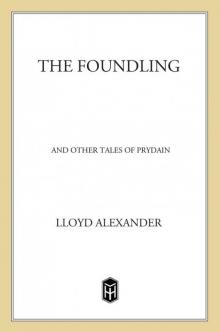 The Foundling and Other Tales of Prydain
The Foundling and Other Tales of Prydain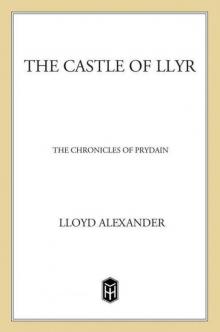 The Castle of Llyr
The Castle of Llyr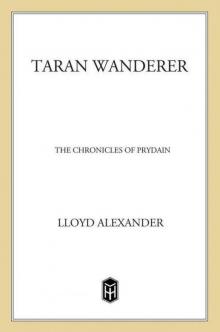 Taran Wanderer (The Chronicles of Prydain)
Taran Wanderer (The Chronicles of Prydain)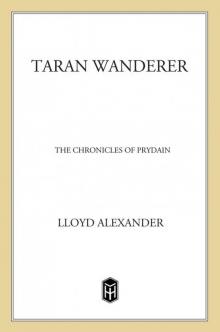 Taran Wanderer
Taran Wanderer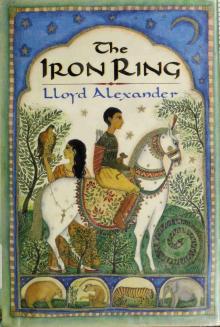 The Iron Ring
The Iron Ring The Arkadians
The Arkadians Fifty Years in the Doghouse
Fifty Years in the Doghouse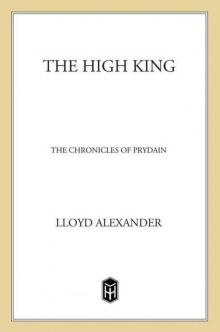 The High King
The High King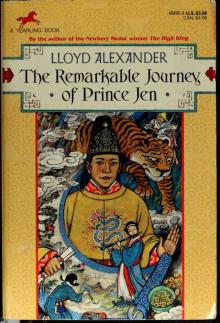 The Remarkable Journey of Prince Jen
The Remarkable Journey of Prince Jen The Book of Three
The Book of Three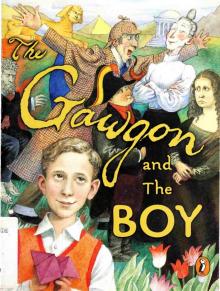 The Gawgon and the Boy
The Gawgon and the Boy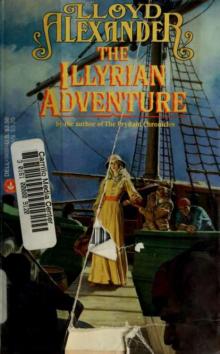 The Illyrian Adventure
The Illyrian Adventure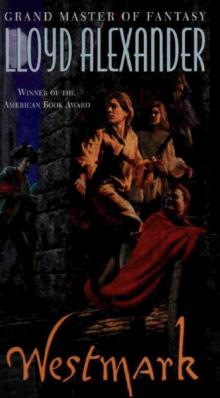 Westmark
Westmark The Black Cauldron
The Black Cauldron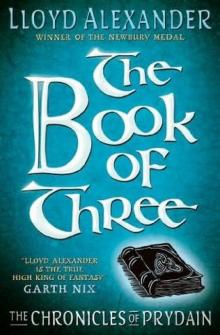 The Book of Three cop-1
The Book of Three cop-1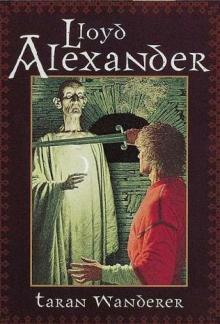 Taran Wanderer cop-4
Taran Wanderer cop-4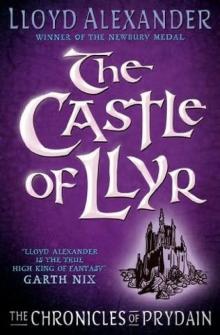 The Castle of Llyr cop-3
The Castle of Llyr cop-3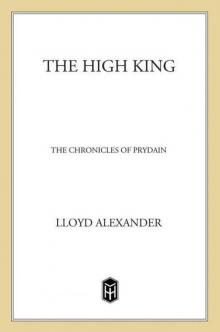 The High King (Chronicles of Prydain (Henry Holt and Company))
The High King (Chronicles of Prydain (Henry Holt and Company))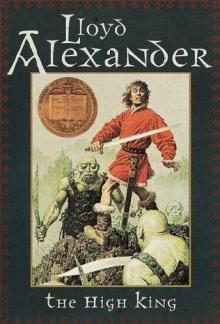 The High King cop-5
The High King cop-5 The Foundling
The Foundling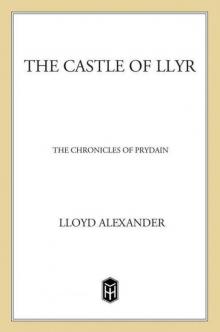 The Castle of Llyr (The Chronicles of Prydain)
The Castle of Llyr (The Chronicles of Prydain)